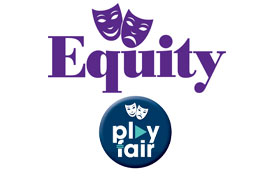Putting disability in the spotlight
3rd July 2021Inclusion and diversity are words featured in many conversations within theatre, which is fantastic; however, what follows on from these discussions? Are theatres recognising the importance for greater representation in the arts, or do they see it more as a box ticking exercise?
We’ve seen many theatres sharing their diversity policies and initiatives with us, but a lot of the time they refer to race and gender and not disability.
For example, The Almeida Theatre mentions nothing of disability in their inclusion policy, and The Royal Court again has no real focus on improving opportunities for those with disabilities.
The Royal Shakespeare Company (RSC), however, is focusing on a four main items between 2018-22, one of which is developing initiatives for underrepresented groups - disability.
These theatre policies show that we seem to be doing a good job of tackling issues with race and gender issues, but prejudice against those with disabilities and other areas of underrepresentation remains rife within our industry. The RSC see that, and others need to follow suit with this inclusive approach.
Even though it isn’t in their policy, The National Theatre (which wants to have a 50:50 gender balance on stage and at ‘least 25% of performers will be Black, Asian or ethnically diverse’ by 2022) was looking for two neurodivergent actors for its production of ‘The Curious Incident of the Dog in the Night-time’.
The National said: "We're committed to this being an inclusive, accessible and far-reaching casting process".
Other major institutions like the RSC and the Globe have also made public commitments to casting disabled and D/deaf actors, including Charlotte Arrowsmith in The Taming of the Shrew in 2019.
Disabled artists are the most underrepresented in theatre, so casting these talented individuals in a disabled role is a hugely positive step in the right direction.
Very often we see able-bodied actors in a disabled role, and no one bats an eyelid, such as Daniel Radcliffe in ‘The Cripple of Inishmaan’. However, it would be a different story if a white person were to play a non-white role. Casting unfairly is a practice still widely accepted – why?
By casting like this, able-bodied actors are taking work and opportunities from an underrepresented group. At the very least, disabled actors should be offered the opportunity to be cast, or to play characters with the same or similar condition. But their opportunities shouldn’t end there either. There is more to them than just their disability and they should be given a platform that they deserve and to show their talent that we’ve been missing out on.

Acting union, Equity has created the campaign ‘Play Fair’ ‘Equity Inclusive Casting Policy’, which challenges the ‘persistent under-representation of diversity, and discriminatory practice in the casting process’.
This campaign highlights the points from their equality policy which includes, ‘artists from diverse backgrounds should be considered more seriously for any role’ and ‘every avenue’ should be considered to cast a disabled actor.
It isn’t only about the casting though; it is quite often to do with the writing. Many disabled roles are written by non-disabled writers, which can lead to stereotypical storylines.
Sometimes disabilities in theatre are seen as a negative trait or a burden e.g. Shakespeare’s Richard III and The Elephant Man. Characters can quite often be perceived as not equal or pitied, which immediately does them a disservice. As well as inclusion, they need equality. We need to move away from these cliched narratives.
Audiences want to see performances that have authenticity with stories to which they can relate. It is empowering, inspiring and helps increase understanding of disabilities by giving an insight into a different experience. It reflects real life, shifts attitudes, answers questions and help reach new audiences.
This is why theatres should be concentrating on including disabled playwrights in their programmes.
As always, there is so much still to do in theatre to make it more inclusive and diverse.
Thanks to organisations like Graeae Theatre Company - ‘a force for change in world-class theatre… and boldly placing deaf and disabled artists centre stage’ – as they continue to lead the way with their amazing array of projects and initiatives that challenge perception and fight exclusion.
The industry is trying to move in the right direction for gender and race equality, but we cannot continue to leave disability and other underrepresented groups behind. We need to work together and fight to improve greater opportunities for all.